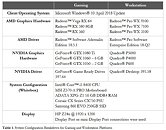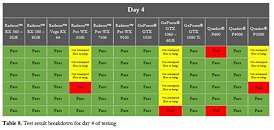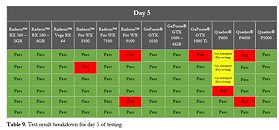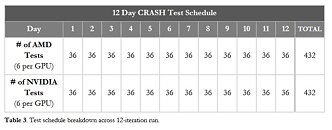Monday, July 16th 2018

QA Consultants Determines AMD's Most Stable Graphics Drivers in the Industry
As independent third-party experts in the software quality assurance and testing industry for over 20 years, QA Consultants has conducted over 5,000+ mission-critical projects and has extensive testing experience and depth in various industries. Based in Toronto, Ontario, QA Consultants is the largest on-shore software quality assurance company, with a 30,000 sq. ft., industry-grade facility called The Test Factory.Commissioned by AMD, QA Consultants used Microsoft's Windows Hardware Lab Kit (HLK) to conduct a 12-day head-to-head test comparing AMD and Nvidia graphics drivers. The test compared 12 GPU's, six from AMD and six from NVIDIA, running on 12 identical machines. All machines were configured with Windows 10 April 2018 Update. Both gaming and professional GPUs were equally represented in the testing. After running for 12 days of 24-hour stress tests, the aggregate of AMD products passed 93% of the scheduled tests. The aggregate of NVIDIA products passed 82% of the scheduled tests. Based on the results of testing the 12 GPUs, QA Consultants concludes that AMD has the most stable graphics driver in the industry.
Sources:
QA Consultants, Graphics Driver Stability Report
About QA Consultants
QA Consultants is the North American leader in software quality assurance and testing services. Having successfully delivered over 5,000 testing and consulting projects to a variety of sectors including automotive and transportation, advertising and marketing, banking and finance, construction, media and entertainment, US & Canadian Federal State and Local government, healthcare, insurance, retail, hospitality, and telecommunications.
The Test Factory is the next generation of software testing, providing a superior quality, cost and service alternative to offshore providers and external contractors. The centre can handle any testing project of any size, with any application and for any industry. With full-time employees in Toronto, Ottawa and Dallas, QA Consultants supports customers by providing testing services such as accessibility testing, agile testing, test automation, data testing, functional testing, integration testing, mobility testing, performance testing, and security testing. Along with engagement models like Managed Consulting Services and On Demand Testing , QA Consultants is equipped to handle any client's request.





124 Comments on QA Consultants Determines AMD's Most Stable Graphics Drivers in the Industry
Hopefully the same.:lovetpu:
It is good to see AMD being good. I like this AMD improving, thing. It has been too long. So long that I don't have anything AMD anymore! Sad. Choice is good, AMD is becoming a choice again.
It is very common for organizations to pay scientific institutions/universities do to research for them and their products, and the last thing these institutions want is to have their reputation ruined due to sponsored bias.
But yeah. Academic value? LOW. The most interesting bit here is seeing the 1060 fail so many tests. If I recall correctly it also suffered some bad driver releases not too long ago in the consumer space.Was this really necessary? All I can say is: you won't be missed...
- 61 out of the 76 Nvidia fails happened on their Quadro cards. So, 80% of Nvidia's fail was on their professional line.
- 27 out of the 31 AMD fails happened on their Pro cards. So, 87% of AMD's fail was on their professional line.
That leaves:
- 15 desktop card fails for Nvidia
--- of which
- 10 fails for GTX1060
- 3 fails for GTX1050
- 2 fails for GTX1080ti
- 4 desktop fails for AMD
---of which
- 2 fails for VEGA 64
- 1 fail for RX 560
- 1 fail for RX580
In summary - the GTX 1060 is a donkey :laugh:
And... their testing is highly questionable if BOTH vendors have 80%+ fail rates on the professional lines.
How did you like them mental gymnastics? :clap:
:D:lovetpu:
:roll:
Last year I made another foray into AMD land and had a 480. My experience was AMD has problems with drivers too. Their driver would frequently crash, and basically carry on if I was lucky with the basic Windows version.
So, they both need work, in my experience.
Edit: yes, I know my experience is anecdotal, not scientific.
Frankly, outside CF installations from years ago, I never had a driver issue on any card.In an argument as to whether the sunset makes the sky look orange or red, isn't made by saying the sky has clouds in it. What I think is being asked is what is the relevance of those specific tests to the intended use of gaming cards. For example, if I was evaluating the suitability of a van for a Florida soccer mom,noting that it failed the tests for trail climbing and performance in deep snow would not be relevant. I'm not the tests address this or they don't; but you will need to address that to make the point.
Again, we have never had real driver stability issues with AMD in years ... not since they went from 4 to 3 digits in their product line. But in in the performance segments we build boxes for ... right now, AMD just doesn't have any products in play. Outside of that, only issues I have had with AMD driver wise were when a problem with a particular new game arises, the time to release of a driver fix was a lot longer than nVidia. Tho that's been getting better and better as time goes on.
Nvidia on the other hand ... i am still on 397.93beta tester are the best! :toast:well i might just be lucky with ATI/AMD then ... :laugh:uh? i did on my R9-270 and 290, didn't had any issues...
The good:
Radeons and Quadro can split workload and VRAM consumption correctly if multiple applications try to use GPU (multiple browsers + YT video + video encoding + online gaming + mining isn't problem, just slow), GeForces can't handle that
Radeons and Quadros have fair rendering in games, GeForces often cheats (even in simpliest games...)
The bad:
During good ol days of AGP and early PCI-E cards Radeons had so much issues with modeling and video editing software so i strictly decided to switch to green. Despite drivers quality and changes to software, that made both AMD and nVidia products equal in general usage, Radeons still ill suitable for the most prosumer tasks: OpenCL is just a word, while CUDA is used almost everywhere.